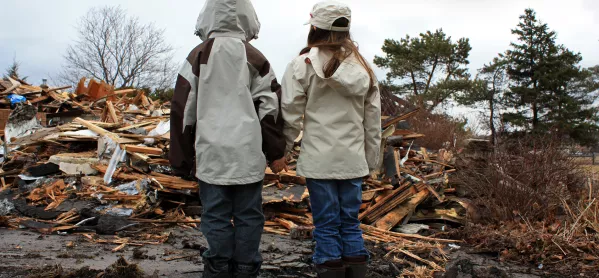Covid impact on education ‘a national disaster’

Teachers fear children have become “feral” and are suffering “extreme” separation anxiety as a result of the pandemic disrupting their education, ministers have been told.
MPs raised concerns shared by teachers in their constituencies as they debated the government’s education catch-up and mental health recovery programmes today.
Robert Halfon, the Conservative chairman of the Commons Education Select Committee, opened the debate by warning that the impact of Covid-19 on education has been “nothing short of a national disaster”.
Background: Protecting pupils’ mental health in Covid and beyond
Halfon: MP bids for triple-lock system to make it harder to close schools in pandemic
Covid: More than 300,000 pupils have the virus
MPs then gave a series of examples in which teachers had highlighted to them how pupils had struggled on returning to the classroom after lockdowns.
Mark Fletcher, Conservative MP for Bolsover, said: “It’s amazing how many of my primary schools have said that children, particularly the youngest, have returned and were unable to share space, were unable to share toys and resources. And that is a massive challenge because of Covid.
“And actually, more than one headteacher has used the word ‘feral’, in terms of behaviour. Pupils returned in a state in which they really had to be managed in a completely different way, on a scale that schools haven’t had to do before.”
How Covid has affected pupils’ mental health
However, the government stressed that it was committed to making sure schools offer a “calm, orderly, safe and supportive environment” to pupils.
Sarah Olney, Liberal Democrat MP for Richmond Park, said: “As I’m speaking to headteachers, I’m hearing all sorts of stories. They’re telling me about the new Reception class that started in September 2021, these four- and five-year-olds, so much of their lives have been spent in lockdown that they’re suffering extreme separation anxiety from their parents.”
She added: “And as we go up through primary school age, what we’re finding is in the older years the ones who had two years at home sat in front of laptops, they’re finding it really difficult to play with each other. Young people, small boys don’t know how to play football in the playground any more.
“I don’t know about anyone else, it’s these little details - particularly as the mother of an eight-year-old son - that I find really distressing: the thought that our young people don’t know how to play with each other, they don’t know how to share in the classroom, they don’t know how to talk to each other.”
Several MPs raised the possibilty of extending the school day to deal with the impact of the coronavirus on children’s learning.
Conservative Jonathan Gullis, who worked as a teacher before becoming MP for Stoke-on-Trent North, was one of them. He said: “I want to, of course, make the point that extending the school days - I absolutely adore the idea of extending the school day - to 5pm, 6pm, for as long as necessary at the end of the day because it’s a building where young people feel safe, they know and an opportunity to build and harbour those relationships with parents who can come into the building and get the benefit of educational classes or opportunities through the family hub model the government is pushing.”
Education minister Robin Walker said that recovery in both education and mental health was “key” for the government, adding: “The best place for young children to be for their education, their mental health and wellbeing, is in the classroom, which is why protecting face-to-face education continues to be our absolutely priority.”
Mr Walker addressed concerns that some children had become upset on going back to school, saying: “It is crucial we make sure schools can offer a calm, orderly, safe and supportive environment where both pupils and staff can thrive.
“Disorderly classrooms don’t just have an impact on children’s ability to learn, they can equally affect their mental health and they can cause some children to stay away from school, missing vital learning time.”
You need a Tes subscription to read this article
Subscribe now to read this article and get other subscriber-only content:
- Unlimited access to all Tes magazine content
- Exclusive subscriber-only stories
- Award-winning email newsletters
Already a subscriber? Log in
You need a subscription to read this article
Subscribe now to read this article and get other subscriber-only content, including:
- Unlimited access to all Tes magazine content
- Exclusive subscriber-only stories
- Award-winning email newsletters



